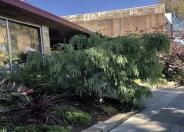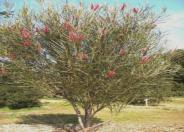
Common name:Myers Asparagus
Botanical name:Asparagus densiflorus 'Myers'
An evergreen groundcover, the 'Meyers' also makes an excellent hanging basket when larger in size. Its formal looking fronds have an even, spiral arrangement of leaflets. It is damaged by severe frosts, and looks best with at least occasional watering.
-Monterey Bay Nursery

Common name:Smooth-edged Agave
Botanical name:Agave weberi
This is a striking medium-sized agave that can grow to 5' tall by 6-10' wide. This agave has very fine marginal teeth, and is sometimes spineless. Supplemental summer watering can prevent yellowing from heat stress in the summer. These plants are also moderately cold hardy, tolerant of temperatures down to 12f. More refined looking than americana. Prone to weevils. Native in Eastern central Mexico. One of the largest of the Agaves.-Mountain States Nursery

Common name:Hairy Wattle
Botanical name:Acacia vestita
Ornamental dense to open shrub or small tree 15-20' with weeping habit and bright yellow ball flowers in spring (absolutely beautiful in flower!). Tolerant of most soil types both coastal and inland. Care should be taken when pruning to maintain pendulous growth habit. Tolerates water logging for short periods. Beautiful specimen for small or large gardens.

Common name:Kangaroo Paws, Red
Botanical name:Anigozanthos hybrids
This tender perennial is a clump-forming evergreen that produces fuzzy, yellow green flowers that bloom in spring and last for over 2 months. Many sizes and varieties are available including yellow and pink flowers.

Common name:Grass-leaf Hakea
Botanical name:Hakea francisiana
Tall shrub or small tree 8-18'. A spectacular hakea in full bloom. Coral-pink flowers in winter. Hardy to drought and frost. Tolerant of well-drained sandy or clay alkaline soils. For best flowering plant in full sun. Hardy landscape plant. Attracts Hummingbirds.
Designer: Cricket Riley
Photographer: Vicki Anderson
Maintain a two to four inch layer of mulch on the soil surface to reduce weeds, infiltrate rain water, and reduce compaction.
Drip and other smart irrigation delivers water directly to roots, allowing no excess water for weeds.